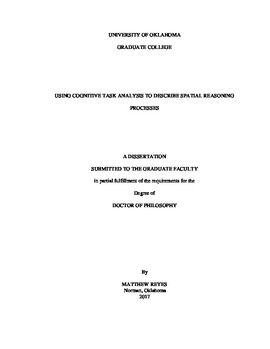| dc.description.abstract | This study is rooted in the idea that the ability to navigate a three-dimensional environment, both in reality and virtually, the ability to imagine and manipulate three-dimensional objects, and the ability to visualize one’s own orientation with respect to an object are important skills. These spatial skills are critical for solving problems and operating in the world. Like many skills, spatial skills can be taught and improved. Educational games are explored as a possible instructional tool for teaching these skills. In order to better understand how such an educational game should be designed, the cognitive components that are involved in solving spatial reasoning tasks were investigated through the use of a cognitive task analysis.
A total of 20 participants performed a series of tasks that involve spatial reasoning. The tasks were all in the domain of Construction Science and were in either construction management or construction engineering categories. The participants were from three different levels of expertise, some students and some working professionals. The participants consisted of six novices, five early practitioners, and nine experts. Using retrospective think-aloud procedures for the cognitive task analysis, each participant reviewed their work while explaining their through processes and answering probing questions, with special attention paid to the mental images they used to solve the problems.
The findings indicate that there are common strategies individuals use to solve problems and that these tools change as expertise develops. Recommendations are made for instructional tools that may foster the development of spatial skills within the domain of Construction Science. The findings indicate that educational games may be a good fit for teaching some skills but not others. One key finding is the potential value of the cognitive task analysis itself as a helpful instructional intervention. | en_US |
